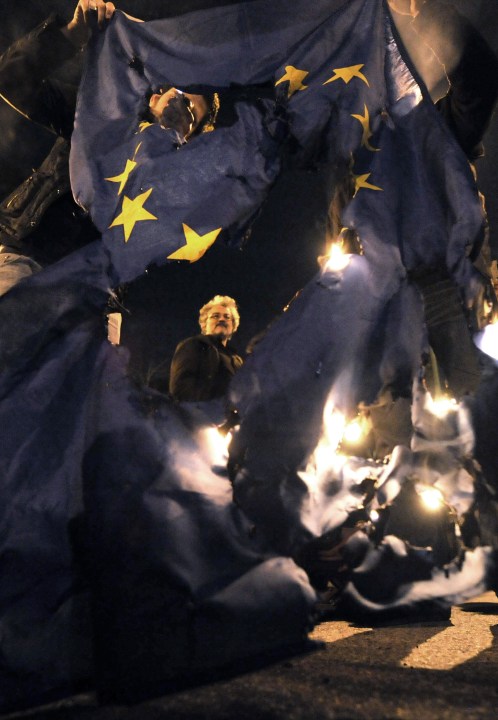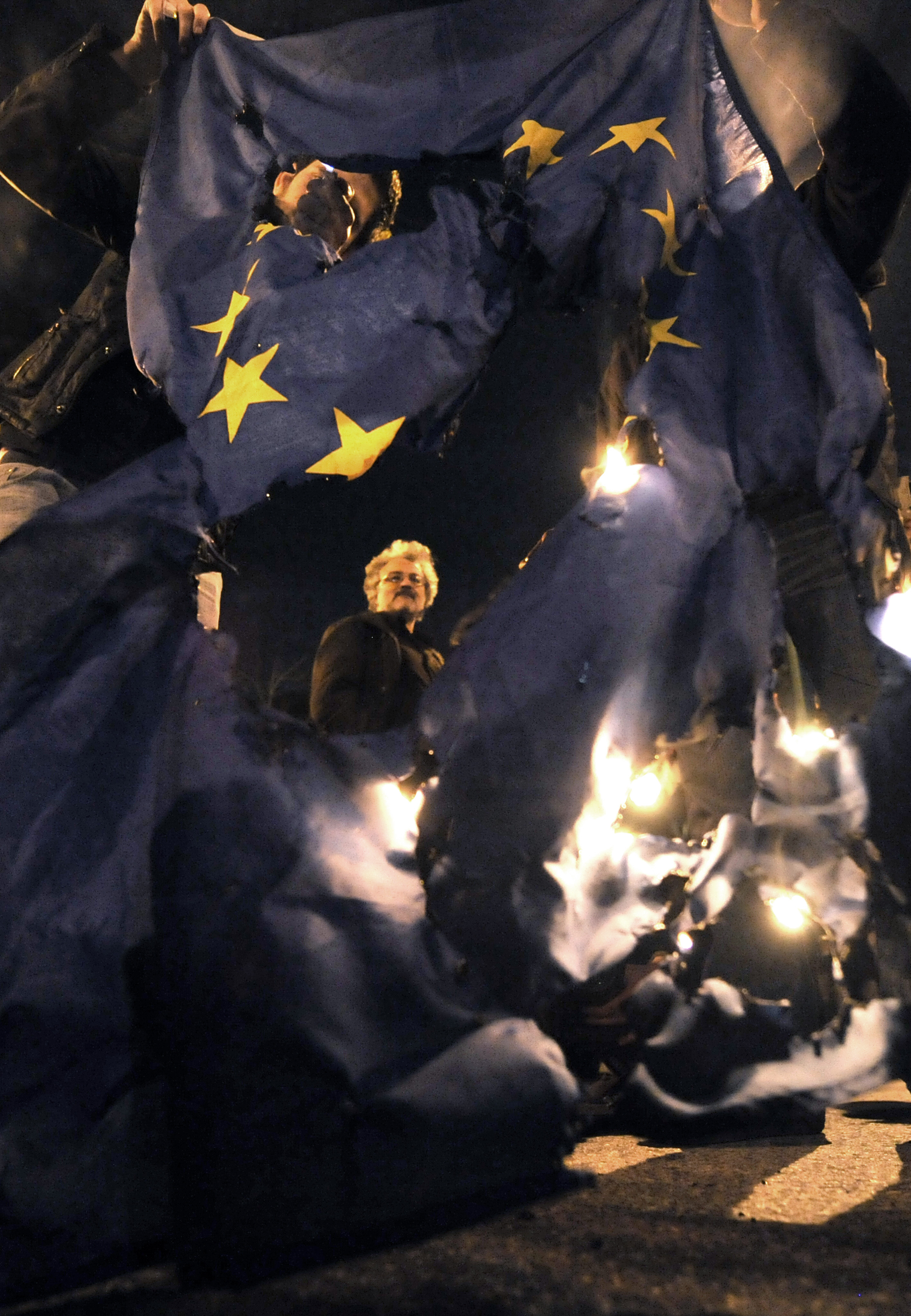 The long flight from Australia should give David Cameron plenty time to think about
Europe, and how it just won’t go away. He didn’t want this battle — not now, not ever. But in the Daily Telegraph today, the first in what will
be a weekly column, I lay out the battlefield that awaits him on his return.
The long flight from Australia should give David Cameron plenty time to think about
Europe, and how it just won’t go away. He didn’t want this battle — not now, not ever. But in the Daily Telegraph today, the first in what will
be a weekly column, I lay out the battlefield that awaits him on his return.
First, this bailout is not the end. A trillion Euros needs to come from somewhere, and today the Chinese are being tapped up — God knows what we’ll agree to in return. But that doesn’t address what is, as Mervyn King has said, a solvency issue rather than a liquidity issue. And the tighter these Eurozone countries squeeze together, the more tension we can expect.
Merkel is right to say that we should not take another 60 years of peace in Europe for granted, but she misses the point that the Euro might as well have been designed to engineer an economic kulturkampf, of the hard-working, high-saving northern states against the manana manana southern states. Greeks understandably dislike being ordered around by foreigners. Germans dislike seeing their savings used to bail out idle southerners whose barbers retire aged 50 on a full pension. The German in charge of the EU’s ‘technical assistance’ taskforce for Greece, Horst Reichenbach, arrived in Athens to find himself dubbed “Third Reichenbach” by the local media. Nazi cartoons are returning to Greek newspapers. German imperial ambitions — real or imagined — are becoming an factor in Poland’s elections.
The Germans are taking this with pretty good grace, given that 66 per cent of them are opposed to the bailout. It was said of Adenauer that he was “a good European but a bad German,” and
Merkel stands open to the same charge. She says, all the time, that “if the Euro fails then Europe fails” and it is precisely this muddy, emotional logic which has led to the problem. The
whole Euro project was a political fudge, the price demanded by Mitterand for Kohl’s reunification of Germany. The low German rates led the Spanish to embark on a property boom and the Greeks to
spend like drunken Keynesians. It was a disaster, and it has ended in a bigger disaster. This bailout game, where leaders fly here and there and get nowhere, is ‘double or quits’ played on a
massive scale. When the trillion-dollar bailout fund fails, what then?
What Greece needs most is the drachma. Then it could default on its debt, the drachma would hit the floor and everyone would go there on holiday — helping it export its way to recovery with
an ouzo stimulus. This is how economies are supposed to work. Its not unusual for an economy to crash, for dodgy bookkeeping to be exposed. But what happens is that the profligate country defaults,
and then crawls its way back to the debt market. It will work, and has done for centuries. David Hume summed it up:
Default is not so easy if the debt is denominated in a foreign currency, though. Countries like Greece have gone bust before, but none have been kept alive to save the greater goal of a European single currency. The idea of this Euro bailout fund issuing its own bonds means, in effect, a Eurobond; that, in effect, that Greece’s debt becomes Germany’s. And it will breed more and more resentment, leading to huge financial contradictions that will resolve themselves in a later, more violent dispute. In 1997 a Harvard academic, Martin Feldstein, predicted precisely this: that the contradictions within the Euro would not just lead to its collapse but the return of nationalism. His analysis, dismissed as fantasy at the time, looks dangerously plausible now.“So great dupes are the generality of mankind, that, notwithstanding such a violent shock to public credit, as a voluntary bankruptcy in ENGLAND would occasion, it would not probably be long ere credit would again revive in as flourishing a condition as before.”
So Europe will be back on the agenda soon, and Cameron will be forced to negotiate — with the other non-Eurozone EU members — what their relationship with the EU would be. I quote a Cabinet member in my piece who says: “The centre of gravity in the party is not between status quo and renegotiation of EU membership. It’s between renegotiation, and leaving the EU completely – and the same is true for the public.” I think he’s right, so Cameron should be able to make common cause with Nick Clegg over this.
Cameron may have thought, before Monday, that he could get away with a Blair-style tactic of saying a new treaty will be a “tidying up exercise” so small it can be whipped through and sent to Her Majesty then posted off to a vault in Rome like the Lisbon Treaty was. If this ever was the plan, it imploded at 10pm on Monday. Cameron’s party won’t wear it, and the odds are that a proper new EU treaty will have to be put to the public in a referendum as described by his much-vaunted Triple Lock mechanism. The oft-invoked but never-consulted British people will then, at last, have their say.
I’d like to finish on what I suspect will be an unpopular point. I would predict that Cameron will renegotiate, that he’ll bring Clegg round and will produce a deal that will be endorsed in a referendum. His missteps so far can be blamed on the poor advice of Major-era veterans who are — in their heads — fighting Tory wars of yore. Cameron adapts, this is his main political skill. Look at how swiftly he got behind No2AV once he worked out the strength of feeling. Steve Hilton’s instincts on this are sound. Europe is not an optional extra. It’s a key part to reclaiming the tools we need to grow. “Renegotiation for jobs” — that’s the mantra.
P.S. Not often I quote him, but Keynes had a point when he said that one country lending vast sums to another would create “strains and enmities” when things went pear-shaped. “To lend vast sums abroad for long periods of time without any possibility of legal redress, if things go wrong, is a crazy construction,” he said. “Especially in return for a trifling extra interest.”








Comments